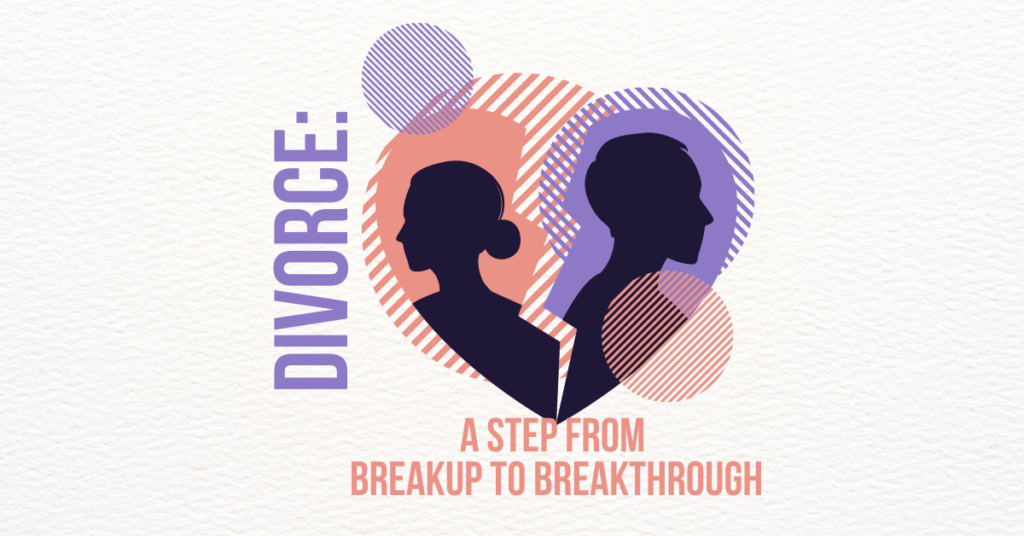
Divorce, an experience that is heavy with a lot of emotions, marks the end of one chapter of life and the beginning of a journey through uncharted waters. It can take toll on one’s mental health when one does not have the correct insight on how to navigate through a divorce and so, through this article, we will explore the stages of divorce, unravel the common reasons behind its occurrence, and discover the resilient ways in which one can overcome the mental stress and emotional turbulence that often accompany this life-altering event.
Understanding Divorce: an overview –
Divorce, as we know, is the dissolution of a marriage. This dissolution or breaking up is not just legally, but also socially. Whether a person is going through a divorce process or is already divorced, there are various aspects to it that they experience – legal implications, financial implications, breaking up of families, separation with children, mental stress and anxiety and often heavy emotions like grief and a sense of loss.
So yes! This journey is profound, it does thrust an individual into a sea of emotions and more often than not challenges one’s fabric of existence. How? Well, this challenge of divorce takes us through different stages which are a rollercoaster of emotions.
Causes of Divorce and Separation: Decoding beneath the surface
When we look at the process of separation or divorce, while it has legal implications, its nature may have a lot to do with psychological experiences, and behavioral patterns of either or both the individuals involved in the marriage. Additionally, one of the other factors that could play a role is financial behavior and decision-making.
Below are some of the common reasons for divorce based on research evidence are as follows -:
1. Communication Breakdown:
Communication, the lifeline of any relationship, can silently erode over time. When with time the meaningful conversations start decreasing, a void is created. This void instead of getting filled, more often than not, keeps on deepening and increasing when with every passing day both partners keep drifting away to the point where they are unable to connect emotionally. This silent erosion becomes a very subtle undercurrent and it starts weakening the bond of the marriage.
2. Infidelity:
Infidelity is a very harsh wound to any marriage and it immediately ruptures the trust between the partners. This in turn completely shakes the foundation of the marriage. It is almost like a catalyst for divorce where loyalty is shattered and one faces bouts of unpleasant emotions where both the partners are pushed towards different paths.
3. Frequent Conflicts:
In marriages when conflicts are left unresolved, they tend to give rise to more conflicts and often, before we know it, the intensity and frequency of these conflicts start increasing to a point where the meaningful conversations decrease significantly and both the partners are stuck in the loop of unresolved conflicts, blame games, avoidance, assumptions, angry outbursts and increased reactivity. This then keeps pushing them constantly to divergent paths in the marriage.
4. Unmet Expectations:
Relationships in reality thrive on how the expectations of both the partners are getting fulfilled. These expectations can be both spoken and unspoken. When these expectations are unmet or are not fulfilled, disappointment festers in the bond and the love and connection are often affected.
5. Financial Strains:
Money can be a potent force in relationships and thus also has a power to become a reason for strain. Money problems can bring in disagreements over financial priorities or there could be mounting debts and economic hardships that can create a storm in a marriage and can really test one’s marriage’s resilience. Financial strains often cause an imbalance in marriages which can lead the couples to part ways.
6. Domestic Violence:
Domestic abuse and violence are a reason for a couple to dissolve marriage. There could be physical assault, manipulation, social isolation and abuse involved in a marriage which leads the person being abused to end the marriage.
7. Lack of Family Support:
When your partner’s family or your own family is not happy with your marriage choice or are unwelcoming towards you or your partner, it can overtime create rifts of conflicts, hurt, pain and can eventually lead to distance and avoidance amongst the partners too due to unfavorable evaluations by the families.
Hence, the causes that lead one or both the partners to even consider the possibility of separation or divorce are varied and can be more complicated than what it may look like on the surface.
The Stages of Divorce: A Deeper Understanding
The experience of divorce for even the most favorable of reasons can bring about a sense of grief and loss, if not about the person but about the loss of a unit as a whole. While dysfunctional patterns in a marriage can lead to divorce, there are times it happens mutually. However, either way, it can lead to an experience that may not always be pleasant while an expectation could bounce back in a short span of time.
Stage 1: The Wave of Shock and Denial
This is the moment when reality strikes in, the ground beneath seems to shake and the familiarity of having a shared future crumbles before you. Divorce now isn’t just a word anymore, it’s now an experience that is happening to you and that strikes as a shock wave.
To cope with that shock, we tend to go into a mode of denial to protect ourselves. Now, it’s very natural for denial to set in because that is your mind’s way of protecting you from the unpleasant emotions that might hamper your mental health. There can be numbness, feeling of shutting-down or even avoidance through denial.
Stage 2: The Storm of Anger and Resentment
As the denial wanes, there are a lot of realizations that might occur. The realizations of how your expectations are shattered, how promises are left unfulfilled and how the whole situation may be unfair to you.
This leads to the stage of anger, which is your outlet for pain during a divorce. This anger and resentment majorly arise due to a looming sense of betrayal, rejection or abandonment. This brings in heated arguments, blame games, and a rollercoaster of emotions.
Stage 3: The Shadows of Grief and Bargaining
Divorce now brings in grief. This grief stems from the sense of losing what you once had, what you could have had and what you know might never have. This grief can also lead to feelings of hopelessness, helplessness and worthlessness and despair.
Within these shadows of grief comes bargaining. Bargaining marks, the phase where we try to think on the lines of what we could have had and various modifications in the same lines.
Stage 4: The Dawning of Acceptance and New Beginnings
This stage is like sunlight after an emotional storm. It is where we start to heal. In this stage, there is introspection, there is acknowledgement and there is a reckoning with reality.
You might not feel completely okay with the divorce, but at this stage, you do feel like you can take a step forward from where you were yesterday. You now may be able to envision life as a single person or a single parent.
Hence, it is essential that we allow ourselves to process each of the stages of divorce for us to become more resilient and heal effectively.
Coping with Divorce: Weathering this Emotional Storm
Coping with divorce, irrespective of the reason for divorce, is essential to bring about a sense of healing and bouncing back both individually and in the community.
1. Seeking Professional Compassion
In the tempest of emotions, seeking the guidance of a therapist or counsellor becomes a vital compass. Taking professional support at this time offers a safe harbour as it provides you with tools to navigate the complex channels of grief, anger, and acceptance. Therapy becomes a free and transformative space for healing and self-discovery.
2. Building a Supportive Network
When one has a support system that is formed through friends and family, it acts as a sturdy anchor in the emotional turmoil of a divorce. Being in the presence of loved ones at this time provides you with empathetic support. It is almost like a sanctuary where one receives understanding, strength and solace.
Often not given enough credit, self-care is an essential go-to for maintaining one’s emotional well-being amidst this time of emotional chaos during or after a divorce. We tend to incline our attention more to external concerns and ignore our inner well-being. Hence, self-nurturing through practicing mindfulness, indulging in personal hobbies, taking care of our body, engaging in regular exercise, becomes crucial for prioritizing mental and physical health as it is a guaranteed investment towards resilience.
4. Embracing Change as a Catalyst
Divorce, for all its pain, is also a catalyst for growth. Trying to embrace change and this ending yet transformative period of life can help you to convert this break-up into a breakthrough! When one embraces change, it becomes a powerful tool towards empowering oneself.
Crafting the Next Chapter: a roadmap to renewal
Preparing for what is to come after the experience and process of divorce provides an opportunity for self-growth and discovery.
Letting-go as a liberation : Before you think otherwise, this does not refer to forgetting the past, rather it points towards releasing the resentment that is gripping you down. Though challenging, forgiving oneself and letting go of the resentment towards your ex-partner becomes a powerful act of self-love. This step helps you move forward unburdened.
Rebuilding Trust, Brick by Brick : After a divorce, when one ventures towards a new relationship, rebuilding trust is almost like an art. It requires a lot of self-reflection and transparent communication. There is a patient construction of a foundation that relies on openness and understanding. Trust once shattered, can be rebuilt through intention and commitment.
Setting Boundaries for New Beginnings : Establishing clear boundaries with the ex-spouse is paramount for navigating the post-divorce landscape. One needs to define roles in co-parenting, maintaining respectful communication, and most importantly creating a space where both individuals can embark on their separate journeys in life. All of these ensure healing and a healthy post-divorce life.
Divorce is a profound experience. An experience with emotional complexities, demands more than just resilience. It needs a compassionate guide through this puzzle of emotions. That’s where a very important realization comes in – therapy is not merely a crutch, rather it’s a lifeline towards healing and self-discovery. In the uncertainty and pain of divorce, therapists provide a safe haven, a sanctuary where grief, anger, and acceptance can be explored with empathy and understanding. Their expertise acts as a compass, navigating individuals through the storm of emotions that accompany this life-altering event.
Understanding the stages of divorce, from the shock of separation to the dawning of acceptance, becomes a profound journey when illuminated by the therapeutic touch. Reasons for divorce, whether it is communication breakdown, infidelity, unmet expectations, and financial strains, therapeutic dialogue can fosters understanding and healing.
Whether seeking professional compassion to navigate the emotions or building a supportive network, therapy provides tools for resilience. The art of self-care, often overlooked, becomes a transformative practice under the guidance of a therapist, promoting mental and emotional well-being. As individuals craft the next chapter of their lives, therapy becomes the roadmap to renewal.
Therapy, in essence, is the key to turning the page after divorce, empowering individuals not just to survive but to thrive in the chapters yet unwritten.
Written By –
Vatsla Mahajan




